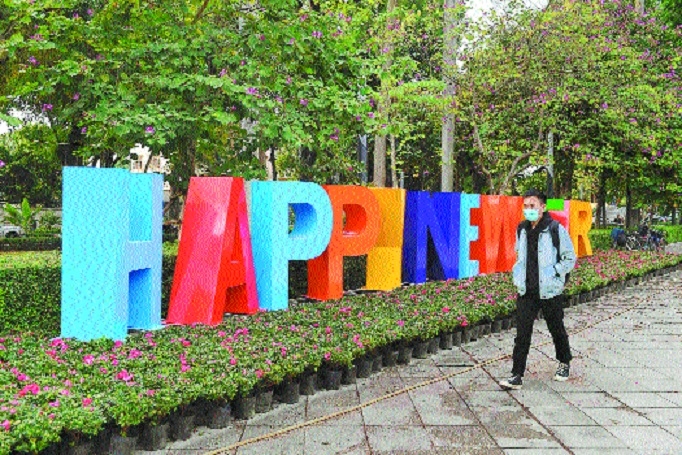Subdued New Year’s festivities worldwide this time
| Date :31-Dec-2020 |

A pedestrian walks past a New Year greeting sign on Wednesday in Hanoi, Vietnam amid COVID-19 pandemic. (AFP)
NEW YORK :
IF EVER a year’s end seemed like cause for celebration, 2020 might be it. Yet the coronavirus scourge that dominated the year is also looming over New Year’s festivities and forcing officials worldwide to tone them down. From New York’s Times Square to Sydney Harbour, big public blowouts are being turned into TV-only shows and digital events. Fireworks displays have been cancelled from the Las Vegas Strip to the Arc de Triomphe in Paris. Even private parties in some places are restricted.
Days ahead of the ball drop in Times Square, it clearly wasn’t New Year’s as usual at the Crossroads of the World. There was room to roam on sidewalks that would normally be all but impassable. New Year’s Eve will look different around the world after a year in which the virus killed an estimated 1.8 million people, including more than 330,000 in the US. Germany banned the sale of fireworks, which residents usually set off in on the streets, and a pyrotechnics show at Berlin’s Brandenburg Gate is off. So, too, are the fireworks over the River Thames in locked-down London, where New Year’s Eve also marks Britains final economic split from the European Union. However, Big Ben, which has been largely silent since 2017 while its clock tower is restored, will sound 12 bongs at midnight. The Netherlands moved the national countdown from an Amsterdam park to a soccer stadium, where spectators won’t be allowed in and pyrotechnics will be replaced with “electric fireworks.”
In Rome, the fireworks are still on, but customary concerts in public plazas have been scrapped in favour of livestreamed performances and art installations. Pope Francis will skip his typical December 31 visit to the Vaticans life-sized Nativity scene in St. Peters Square and plans to deliver his New Years Day blessing indoors, to prevent crowds from gathering. Rio de Janeiro nixed the fireworks, open-air concerts and rooftop parties that draw crowds of white-clad revellers in the Copacabana neighbourhood, where only residents will be allowed in. In Russia, New Year’s Eve has been more widely celebrated than Christmas, which is marked on Jan.
7 by the country’s Orthodox Christian majority. Public events have been banned or restricted in many regions. But the country’s so-called New Year’s Eve capital, the city of Kaluga, is luring tourists with a week of festivities, despite pleas from residents to cancel. Officials in Kaluga, 150 kilometres (90 miles) south-west of Moscow, said virus precautions will be taken. Poland has told residents not to circulate between 7 pm on Dec. 31 until 6 am on Jan. 1. Turkey declared a four-day lockdown starting on New Years Eve, and President Recep Tayyip Erdogan warned that security forces will inspect hotels for illicit parties.